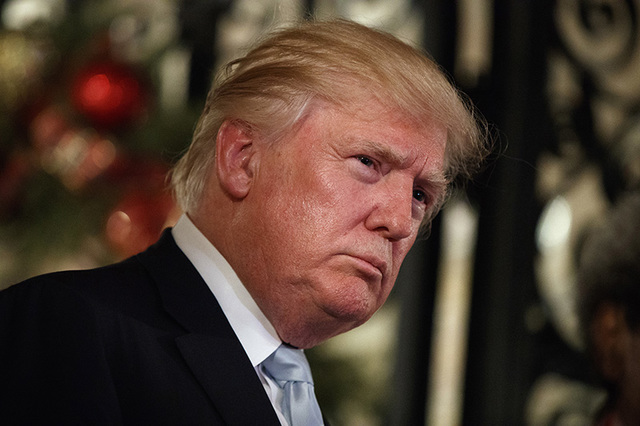BuzzFeed News became the center of a swirling debate over journalistic ethics Tuesday after its decision to publish a 35-page document carrying explosive, but unverified, allegations about ties between the Russian government and President-elect Donald Trump.
The document, a dossier prepared by a former British intelligence officer hired by Trump’s political opponents, had been circulating among high-ranking politicians and some journalists since the fall. Intelligence officials recently presented a two-page summary of the allegations to Trump and President Barack Obama, CNN reported Tuesday.
But CNN declined to include the specific allegations contained in the dossier — such as collusion between Trump’s team and Russian operatives — saying that its journalists could not independently verify them.
Roughly an hour later, BuzzFeed, in a break from typical journalistic practice, posted the document that fully detailed the unverified allegations to which CNN had alluded.
“BuzzFeed News is publishing the full document so that Americans can make up their own minds about allegations about the president-elect that have circulated at the highest levels of the US government,” BuzzFeed wrote.
Ben Smith, BuzzFeed’s editor-in-chief, declined to comment beyond the article, which carried the bylines of three BuzzFeed reporters. But in a memo to his staff, Smith offered a further explanation about why the site had published the document.
“Our presumption is to be transparent in our journalism and to share what we have with our readers,” Smith wrote. “We have always erred on the side of publishing. In this case, the document was in wide circulation at the highest levels of American government and media.
“Publishing this document was not an easy or simple call, and people of good will may disagree with our choice,” Smith added. “But publishing this dossier reflects how we see the job of reporters in 2017.”
The reports by CNN and Buzzfeed sent other news organizations, including The New York Times and The Washington Post, scrambling to publish their own articles, some of which included generalized descriptions of the unverified allegations about Trump. By late Tuesday, though, only BuzzFeed had published the full document.
BuzzFeed’s decision, besides its immediate political ramifications for a president-elect who is to be inaugurated next week, was sure to accelerate a roiling debate about the role and credibility of the traditional media in today’s frenetic, polarized information age.
Of particular interest was the use of unsubstantiated information from anonymous sources, a practice that fueled some of the so-called fake news — false rumors passed off as legitimate journalism — that proliferated during the presidential election.
CNN said that its journalists had reviewed the full 35-page compilation of memos, the same document later published in full by BuzzFeed, but declined to include some details, saying that the network “has not independently corroborated the specific allegations.” CNN said its reporters spoke with multiple high-ranking intelligence and government officials before publishing its report.
In a brief interview in the Times newsroom Tuesday evening, Dean Baquet, the executive editor of The Times, said the paper would not publish the document because the allegations were “totally unsubstantiated.”
“We, like others, investigated the allegations and haven’t corroborated them, and we felt we’re not in the business of publishing things we can’t stand by,” Baquet said.
On social media, some left-leaning writers who generally oppose Trump expressed skepticism about the document published by BuzzFeed.
“An anonymous person, claiming to be an ex-British intel agent & working as a Dem oppo researcher, said anonymous people told him things,” wrote Glenn Greenwald, the journalist who was instrumental in publishing Edward Snowden’s leaks about government surveillance.
But BuzzFeed’s move was welcomed by some people, who expressed concern that news outlets and government officials with access to the allegations had not disclosed them sooner. Almost immediately, the report’s publication prompted questions from Hillary Clinton’s camp about why the claims had not surfaced earlier.
“Today has brought a gush of reporting that outlets knew about and sat on prior to November 8,” Brian Fallon, Clinton’s chief campaign spokesman, wrote on Twitter. He added, in a second message: “I repeat: certain media outlets were told this prior to November 8.”
Mother Jones, a left-leaning publication, published an article in late October about the existence of the information. Newsweek also published some of the allegations.
Immediately after BuzzFeed’s publication, some reporters volunteered that they, too, had received copies of the report.
“Raise your hand if you too were approached with this story,” Julia Ioffe, a journalist who has written extensively on Russia, wrote on Twitter, adding that she had not reported on the information in the document “because it was impossible to verify.”
Writers at the blog Lawfare, which covers national security issues, said they had been in possession of the document “for a couple of weeks” but opted not to publish because the allegations were unproven.
“Yes, they are explosive; they are also entirely unsubstantiated, at least to our knowledge, at this stage,” the site wrote Tuesday night. “For this reason, even now, we are not going to discuss the specific allegations within the document.”
Trump, for his part, seized on the report Tuesday evening to denigrate the news media and his detractors.
“FAKE NEWS — A TOTAL POLITICAL WITCH HUNT!” the president-elect wrote in a message on Twitter.






